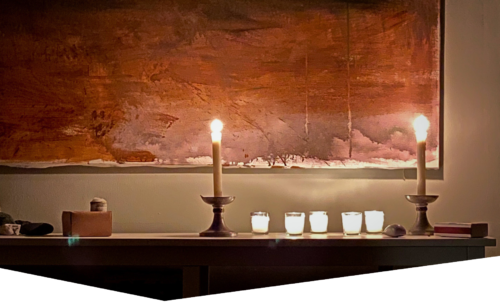
Lit candles in Sonja’s living room. Photo by Sonja Livingston
By Sonja Livingston, Yes! Magazine, April 7, 2020
https://www.yesmagazine.org/opinion/2020/04/07/coronavirus-mindfulness
Do not think of it as quarantine,
someone said recently.
Think of it as a cloister. . .
We are in profound need of the sacred.
That thought led me to start lighting candles at night. My husband and I sit and listen to chants by the Benedictine nuns from a monastery in Missouri or look at our cats and talk about what’s on our minds—the commodification of art, for instance, how close the magnolia buds are to opening, or when toilet paper might return to store shelves.
Because my husband is immuno-compromised and I have a nagging cold, we sit on opposite ends of the sofa or in different chairs, several feet apart. Often we sit in the soft glow and don’t say a word.
In this way, we’re transforming our rather ordinary little house into a sanctuary.
Which makes me think of Marie Kondo and the collective cultural crush we all had on the tidying guru last winter. Most people admired Kondo’s organizing advice, no doubt, but her unexpected reverence was what snagged me.
In her Netflix series, Kondo would close her eyes and kneel in the space she was about to make right—a space usually marked by frustration and chaos.
Kneeling in silence was not the usual stuff of reality TV. The house’s inhabitants squirmed or giggled at first, but eventually became still.
Marie Kondo didn’t call her action prayer. She was, quite simply, bowing to the house and asking its blessing before she began her work.
And yet, much like the houses’ inhabitants, I was so caught off guard by this action, I was often moved to tears.
I suppose I feel a bit like Marie Kondo kneeling in the foyer of a stranger’s house when I sit in candlelight every night.
Yes, the world’s in the midst of great suffering and massive uncertainty. But for a few moments each night, we elevate our time together and consecrate it with stillness and attention.
We are in profound need of the sacred.
Call it what you will: holiness; God; hope; light.
The particular vocabularies and personal trappings surrounding our conception of this vast goodness often twist us into knots, but at no time have we been more severed from sources of connection that go beyond individual circumstances.
In these days of isolation and fear, the longing is even more pronounced. And yet, we have never been more cynical of the trappings in which the sacred is traditionally conveyed.
Many abandoned mainstream religion long before the virus—and for good reasons, given the scandals, political maneuvering, discrimination and blatant cruelty.
While my own need for ritual and mystery sent me back to childhood church a few years ago, none of my friends or family still find solace at Mass—and despite a desperate call to my priest last week, it does not look like I can get into my old church.
Which left me hankering for some incense and a candle rack. A seemingly small desire in this time of lost jobs, lost vacations, lost weddings, lost family members.
What in the world is happening, everyone seems to be asking, heads spinning, while doing whatever we can to hold onto what we still have—which for me is a husband, two cats and a few candles every night.
Listen. I’m just as panicked as everyone else. I hoard boxes of spaghetti and Kleenex and scroll through my Twitter feed reading coronavirus statistics.
I overeat fresh-baked bread in attempt to shore myself against the time when all the loaves might disappear. I wipe down doorknobs and cling to my bottle of hand sanitizer like it’s a long-lost love.
I binge-watch Netflix and ruminate over the heartbreaking necessity of social distancing and whether my niece who waitressed at Denny’s will be able pay her rent and if my father-in-law in his 80s will get through this thing and how on earth my dwindling urban church will survive without its weekly collection plate and much more superficially who will cut and style all our hair.
Just this morning, I watched a video on how to fashion a face mask out of a bra and, even as I type these words, I find myself wondering when I’ll be able to touch my husband again.
But for about 20 minutes at the end of the day, all of this drops away.
We listen to the sisters chant Salve Regina or to the monks at Plum Village chant the Namo Avalokiteshvara accompanied by violin and prayer bowl.
It does not matter if we sit in our small living room. It could be the dining room, the kitchen, or even the bathroom.
It’s not about the room. The music. Or even the candles, really.
It’s about making ourselves still in the face of uncertainty.
It’s about closing our eyes and opening ourselves to the flickering moment and all that actually surrounds us—the good, the bad, the unknown.
It’s about sifting it through the net of our undivided attention, and honing our sense of what’s beautiful and true and lasting in this world.

